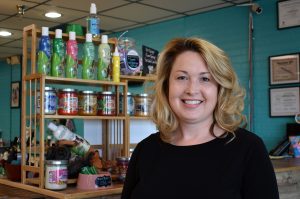Editor’s note: This story was originally published by The Kansas City Beacon, a member of the KC Media Collective, which also includes Startland News, KCUR 89.3, American Public Square, Kansas City PBS/Flatland, and Missouri Business Alert.
Click here to read the original story.
In 2018, Ashley Stillings was living in Hope House, a homeless shelter in Lee’s Summit, with her three children. Her husband had received a 12-year prison sentence and she found herself her household’s sole provider.
Stillings was working as a waitress when she came across a flier stating that pet groomers can earn $20 an hour. The flier was for Pawsperity, a nonprofit that trains students to become dog groomers. Stillings visited an open house to learn more.
“I honestly wasn’t even really a dog person,” she said. “But $20 an hour sounded pretty good, being in a shelter with your three kids.”
Pawsperity, formerly known as The Grooming Project, is the pilot program of Empowering the Parent to Empower the Child, a nonprofit that seeks to break cycles of poverty by providing parents with financial stability through pet grooming. Through the grooming school program, students learn the necessary skills to successfully work their way into a new industry and a new stage of independence.

Natasha Kirsch, Pawsperity, formerly The Grooming Project; Photo by Channa Steinmetz, Startland News
“We give priority to students that are parents because we really focus on that two-generation approach to breaking the cycle of poverty,” said Natasha Kirsch, the founding CEO of Pawsperity.
Kirsch got the idea for the program while she was working at shelters for people who were unhoused and recovering from addiction. She witnessed a recurring issue that parents face — securing low-wage jobs eliminates their government benefits and housing subsidies, but does not provide them enough to cover their financial obligations.
“If they get a job making 10, 12 bucks an hour working full time, they lose all of their benefits,” Kirsch said. “And then they will actually have to quit their jobs to go back on welfare to take care of their family.”
“I knew that whatever the job was, it had to be a living-wage trade, it had to be something where if mom needed to make a lot of money, she could,” she said.
Why Pawsperity was founded
Like Stillings, many of the students are parents who are unhoused or on the verge of houselessness. To provide stability for them while they are taking classes, Pawsperity offers a place to stay in a six-unit family housing complex.
The program also provides formerly incarcerated individuals — who are unemployed at a rate of 27 percent — with an opportunity to enter the workforce. As many as 40 percent of Pawsperity students are coming from prison or on probation, Kirsch said.
“We’ve had judges that will send people to our program,” she said. “And instead of giving them 12 years in prison, they’ll give them 12 years of probation if they graduate from our school.”
Students may also be individuals leaving toxic and dangerous relationships or parents trying to reclaim children after having their parental rights suspended.
“Most of the people that come through our door have multiple issues,” Kirsch said.
“It’s not usually just one thing, there’s five or six large barriers that they need to work through, to make it so that they can be stable enough to take care of their family.”
Kirsch chose the dog grooming industry as her avenue to help struggling families because of its demand in Kansas City. Her mom was a dog groomer, and she knew the profession was in demand.
Dog grooming is a high-demand industry in Kansas City; photo by Chase Castor, The Kansas City Beacon
On any day in Kansas City there’s about 28 openings for dog groomers,” Kirsch said in a video for the Ewing Marion Kauffman Foundation, one of her funders.
All of her students secure a job after graduating from the program. Many will have multiple offers lined up. Kirsch said her groomers often start out earning around $40,000 a year, about $1,500 higher than the state’s average income.
The industry also allows for growth, as many groomers can see swift increases in their pay over time.
Stillings, who works 30 hours a week at Woof’s, a “play and stay” space for dogs in Lawrence, Kansas, currently makes $40,000 a year and is expecting a raise soon.
The highest-earning graduate of the program is now making more than $90,000, Kirsch said.
Making it through the program
Eight of 10 Pawsperity students graduate from the grooming program, and all graduates so far have put their skills to use in the workforce.
But the program isn’t easy. While Pawsperity provides a $3,000 stipend, students still have to find a way to provide for themselves and their families.
“You’re basically there Monday through Friday. It’s a full-time gig,” said Stillings, the recent graduate. “So to compensate, I also waitressed on the weekend. I was just going nonstop without a day off for that entire period. So that was exhausting.”
The 20% of students who don’t make it to graduation are often derailed by obstacles such as lack of transportation or having to work other jobs, Kirsch said. And all of her students have to overcome the baggage of difficult lives.
“Our students have grown up in prisons or on the streets. And the skill set that you need to survive on the streets doesn’t always translate well to the classroom or to a job,” Kirsch said.
“And so what we do is try to help them with their professional skills, and their communication, and controlling their own emotions. So that when they graduate from our program, they can retain their job. That’s the biggest piece. Anybody can get a job. But can you keep the job?”
And so, while students learn the basics of dog grooming — nail trimming, bathing, blow drying, and scissor work — Tuesday through Friday, Monday classes are dedicated to life skills, like problem solving, communication, budgeting and parenting. Social workers also assist in guiding lessons.
Dog grooming is an ideal skill for developing emotional stability, Kirsch added.
“A dog won’t let you work with them if you don’t have your own emotions under control,” she said. “And so our students, who are coming from these lives of trauma, don’t always have their emotions under control… And they have to learn that if they want to work with the dogs.”
Getting up and running
By the time Kirsch drew up her plan to get Pawsperity off the ground, she estimated she needed about $500,000 in funding.
That proved to be a significant obstacle.
For a year and half, she was rejected by every funder she pitched her idea to, Kirsch said.
“People think that just because you’ve come up with a really great idea that you can get it started,” she said in her video for the Kauffman Foundation. “And not only get it started but get it to keep growing and running how it’s supposed to run.”
Kirsch succeeded in getting funding through sheer persistence. She continued to pitch her idea to organizations that could help her. Eventually, she lined up enough funding.
“It showed them that I wasn’t going away and they actually felt like she’s going to stick this out until it works,” she said.
Pawsperity now receives money fromgrant funding and individual donations.
In November, the nonprofit was awarded a $200,000 “neighborhood builders” grant from Bank of America.
At the start, Pawsperity graduated about 20 students a year. It is using new funds to expand its capacity for students and programs. Its newly constructed building, located on 58th Street and Troost Avenue, is nearing completion and will triple the school’s size.
With the new building, Pawsperity will have the capacity to work with more than 80 students a year, as well as offer additional doggy day care services and an on-site market-rate grooming salon.
The Bank of America grant will allow Kirsch to begin looking into building a second housing unit for students. She also plans to start a youth workforce training program.“The goal is that we could start working with youth aging out of foster care or youth that are at a high-risk situation for homelessness,” she said. “And they could learn how to do bathing and brushing or pet handling and safety, or eventually move on to our grooming program.”
In spite of the busy schedule and increased responsibilities of the training, the grooming program holds the potential for a fresh start.
Students at Pawsperity’s grooming school groom pets as part of their training; photo by Chase Castor, The Kansas City Beacon
Four years ago, Stillings was unhoused and working an hourly waged job. Now, she has bought a house, owns three cars and has her children enrolled in extracurricular activities.
“I would just never have thought we would be here where we are right now,” she said.
Next year, Stillings plans to open up her own grooming salon in Topeka, Kansas. Her dream is to eventually open an adjacent day care center. She will also be teaching her oldest daughter how to groom, so that she’ll have a skill to fall back on should she ever need it.
“It’s a great industry for all around,” Stillings said. “You make good money and the dogs are therapeutic too. I like working with dogs over people.”
Mili Mansaray is the housing and labor reporter at The Kansas City Beacon.
This story is possible thanks to support from the Ewing Marion Kauffman Foundation, a private, nonpartisan foundation that works together with communities in education and entrepreneurship to create uncommon solutions and empower people to shape their futures and be successful.
For more information, visit www.kauffman.org and connect at www.twitter.com/kauffmanfdn and www.facebook.com/kauffmanfdn





































